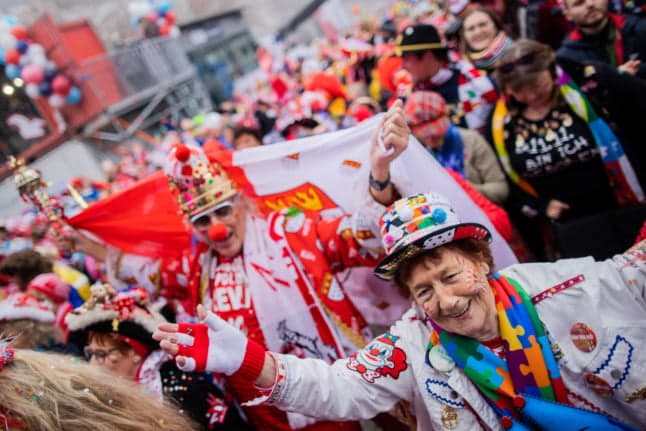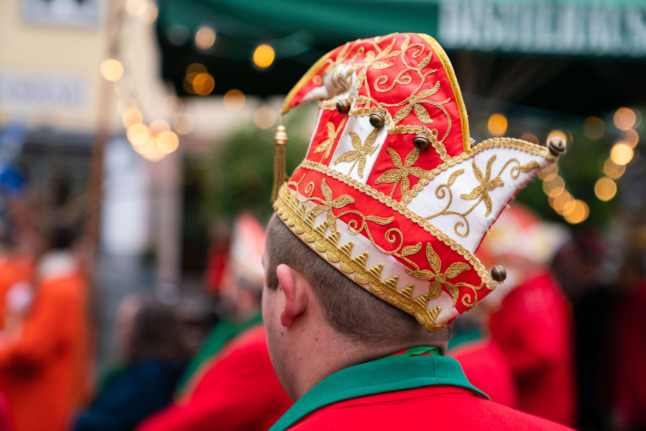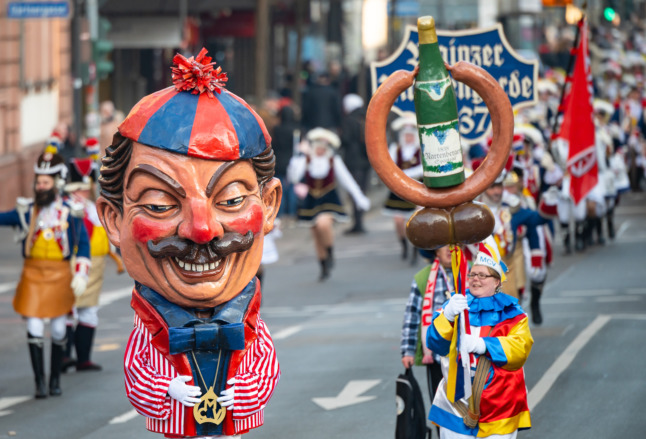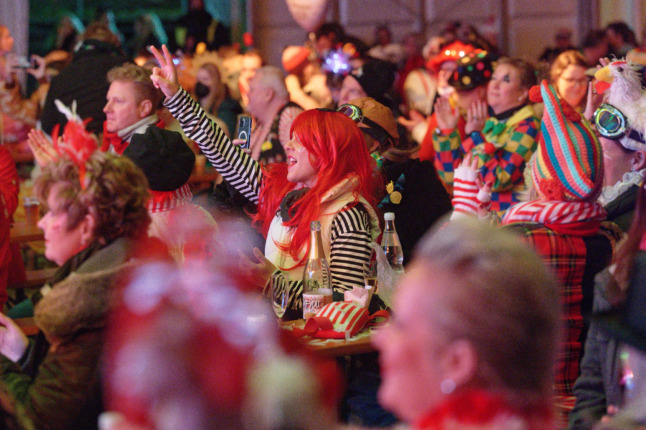What you need to know about celebrating carnival in Germany

One of Germany’s biggest and most beloved festivals, carnival, has been celebrated for hundreds of years. With celebrations kicking off on Saturday November 11th, we take a look at this colourful cultural phenomenon.
What exactly is carnival and how do the Germans celebrate it?
Germany's carnival season generally begins at the 11th minute of the 11th hour on the 11th day of the 11th month and lasts right through to Ash Wednesday the following year.
And though English speakers might simply know it as "carnival", there are actually several terms for the German carnival, depending on the region.
Those in the Rhineland use the term Karneval, while people in neighbouring Bavaria or Saxony tend to call it Fasching and people from Hesse or Saarland call it Fastnacht. Although none of the carnival dates are official public holidays, they are a big part of German culture.
READ ALSO: Fasching: Tracing the roots of southern Germany's 'dark carnival'
How are the festivities being opened this year?
In Cologne - arguably the most famous of the German celebrations dating back to the Middle Ages - will kick off at the Heumarkt this Saturday under the theme of "Wat e Theater - wat e Jeckespill" (What a theatre, what a carnival game). The theme is meant to represent the relief of carnival in the midst of the stress of global events like the pandemic and war, according to the organises.
During the grand opening, parties and events pop up at bars, pubs and on streets all over the city - and this year is no exception. You can find a full list of them on Rhein24, but be aware: you may have to buy tickets for some in advance.
READ ALSO: Düsseldorf Helau! How I embraced the Rhineland's carnival celebrations
In rivaling Düsseldorf, meanwhile, the custom of "waking Hoppeditz'" - the arch-jester who presides over the city's festivities - takes place at the town square on November 11th.
Every year, the Hoppeditz (played by Tom Bauer) awakens and crawls out of the mustard pot after his long sleep and reads the foolish riot act to the city authorities, Düsseldorf and the carnival revellers to prepare them for the months of fun ahead. Following this jovial start, bands will perform and parties will erupt all over the cities.
Other regions celebrating carnival include Mainz, Munich, Aachen, Stuttgart, Frankfurt, Bremen, Nuremberg, and Cottbus.
Here are the key events of the carnival season:
Weiberfastnacht (women’s carnival night) falls on the 8th of February next year and constitutes a highlight of carnival celebrations.
As the name suggests, this day is traditionally about reversing gender roles, with women taking power for a day.
Some traditions on this day include Dreigestirn, where three people take on the roles of Jungfrau (maiden, typically played by a man), Prinz (prince) and Bauer (peasant), dressing up accordingly, and Krawatten abschneiden (literally tie cutting), where women cut off the men’s ties in a symbolic castration.

A reveller celebrating Fasching in Würzburg, Bavaria on November 11th. Photo: picture alliance/dpa | Nicolas Armer
While there’s usually no official parade on this day, people still dress up and celebrate on the streets.
Rosenmontag, the Monday after Weiberfastnacht, next year on the 12th of February, is the day of the Umzüge (parades). These huge parades are what you most likely associate with the German carnival, where people dress up in elaborate costumes, on board their Prunkwagen (floats).
The parades feature crowds singing carnival songs, dancing, throwing Kamelle (caramel flavoured sweets) and satirical, political messaging displayed on huge papier-mâché Schwellköpp – something Mainz’s carnival is especially known for.

An example of the Mainz 'Schwellkopp' in January 2020. Photo: picture alliance/dpa | Andreas Arnold
Karnevalsdienstag or Faschingsdienstag on February 13th is the second day of carnival in 2024.
In the Rhineland, this is when the Nubbelverbrennung (nubbel burning) takes place, where a traditional, life-sized straw doll, known as a Nubbel, is set in flames. The Nubbel stands in as a scapegoat for all the misdemeanours of the carnival season – burning him ensures a prosperous year ahead.

People celebrate a carnival event in Cologne on February 4th. Photo: picture alliance/dpa | Henning Kaiser
Aschermittwoch falls on the 14th of February next year and marks the end of carnival with a big Festessen (feast) – well deserved after long nights of singing, shouting and dancing. On this day, like Ash Wednesday in other countries, a period of fasting begins until Easter.
Some other carnival terms to know:
“Alaaf!” = traditional carnival greeting of Cologne
das Bützchen = a small kiss given to strangers
der Fastnachtskrapfe = jelly-filled carnival donuts
“Helau!” = traditional carnival greeting of Düsseldorf
der Jeck, der Narr = the jester / the fool (a popular costume idea)
die Kamelle = sweets thrown down from floats on Rosenmontag, traditionally caramel flavoured
der Prunkwagen = the float
der Umzug = the parade
Comments
See Also
What exactly is carnival and how do the Germans celebrate it?
Germany's carnival season generally begins at the 11th minute of the 11th hour on the 11th day of the 11th month and lasts right through to Ash Wednesday the following year.
And though English speakers might simply know it as "carnival", there are actually several terms for the German carnival, depending on the region.
Those in the Rhineland use the term Karneval, while people in neighbouring Bavaria or Saxony tend to call it Fasching and people from Hesse or Saarland call it Fastnacht. Although none of the carnival dates are official public holidays, they are a big part of German culture.
READ ALSO: Fasching: Tracing the roots of southern Germany's 'dark carnival'
How are the festivities being opened this year?
In Cologne - arguably the most famous of the German celebrations dating back to the Middle Ages - will kick off at the Heumarkt this Saturday under the theme of "Wat e Theater - wat e Jeckespill" (What a theatre, what a carnival game). The theme is meant to represent the relief of carnival in the midst of the stress of global events like the pandemic and war, according to the organises.
During the grand opening, parties and events pop up at bars, pubs and on streets all over the city - and this year is no exception. You can find a full list of them on Rhein24, but be aware: you may have to buy tickets for some in advance.
READ ALSO: Düsseldorf Helau! How I embraced the Rhineland's carnival celebrations
In rivaling Düsseldorf, meanwhile, the custom of "waking Hoppeditz'" - the arch-jester who presides over the city's festivities - takes place at the town square on November 11th.
Every year, the Hoppeditz (played by Tom Bauer) awakens and crawls out of the mustard pot after his long sleep and reads the foolish riot act to the city authorities, Düsseldorf and the carnival revellers to prepare them for the months of fun ahead. Following this jovial start, bands will perform and parties will erupt all over the cities.
Other regions celebrating carnival include Mainz, Munich, Aachen, Stuttgart, Frankfurt, Bremen, Nuremberg, and Cottbus.
Here are the key events of the carnival season:
Weiberfastnacht (women’s carnival night) falls on the 8th of February next year and constitutes a highlight of carnival celebrations.
As the name suggests, this day is traditionally about reversing gender roles, with women taking power for a day.
Some traditions on this day include Dreigestirn, where three people take on the roles of Jungfrau (maiden, typically played by a man), Prinz (prince) and Bauer (peasant), dressing up accordingly, and Krawatten abschneiden (literally tie cutting), where women cut off the men’s ties in a symbolic castration.

While there’s usually no official parade on this day, people still dress up and celebrate on the streets.
Rosenmontag, the Monday after Weiberfastnacht, next year on the 12th of February, is the day of the Umzüge (parades). These huge parades are what you most likely associate with the German carnival, where people dress up in elaborate costumes, on board their Prunkwagen (floats).
The parades feature crowds singing carnival songs, dancing, throwing Kamelle (caramel flavoured sweets) and satirical, political messaging displayed on huge papier-mâché Schwellköpp – something Mainz’s carnival is especially known for.

Karnevalsdienstag or Faschingsdienstag on February 13th is the second day of carnival in 2024.
In the Rhineland, this is when the Nubbelverbrennung (nubbel burning) takes place, where a traditional, life-sized straw doll, known as a Nubbel, is set in flames. The Nubbel stands in as a scapegoat for all the misdemeanours of the carnival season – burning him ensures a prosperous year ahead.

Aschermittwoch falls on the 14th of February next year and marks the end of carnival with a big Festessen (feast) – well deserved after long nights of singing, shouting and dancing. On this day, like Ash Wednesday in other countries, a period of fasting begins until Easter.
Some other carnival terms to know:
“Alaaf!” = traditional carnival greeting of Cologne
das Bützchen = a small kiss given to strangers
der Fastnachtskrapfe = jelly-filled carnival donuts
“Helau!” = traditional carnival greeting of Düsseldorf
der Jeck, der Narr = the jester / the fool (a popular costume idea)
die Kamelle = sweets thrown down from floats on Rosenmontag, traditionally caramel flavoured
der Prunkwagen = the float
der Umzug = the parade
Join the conversation in our comments section below. Share your own views and experience and if you have a question or suggestion for our journalists then email us at [email protected].
Please keep comments civil, constructive and on topic – and make sure to read our terms of use before getting involved.
Please log in here to leave a comment.